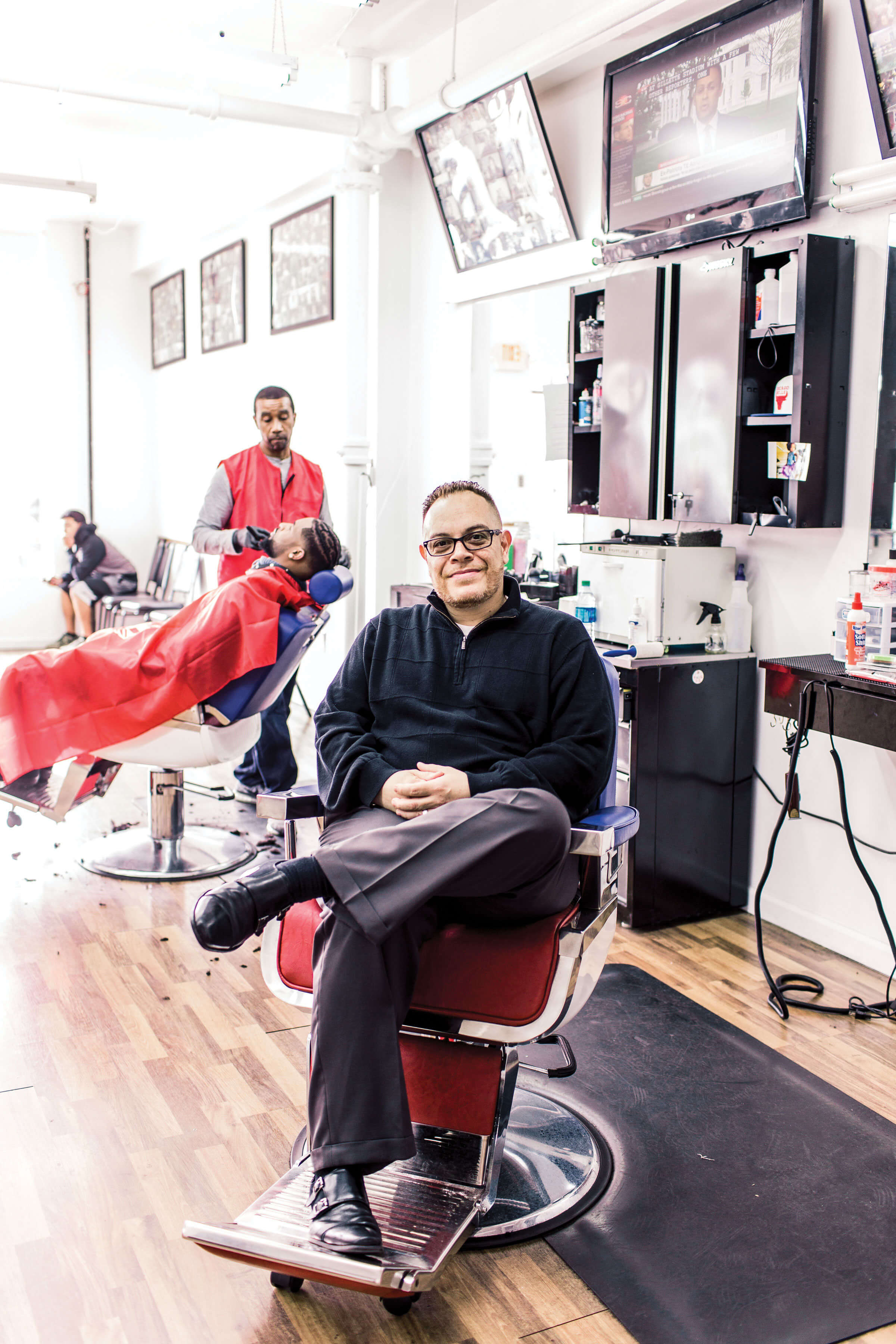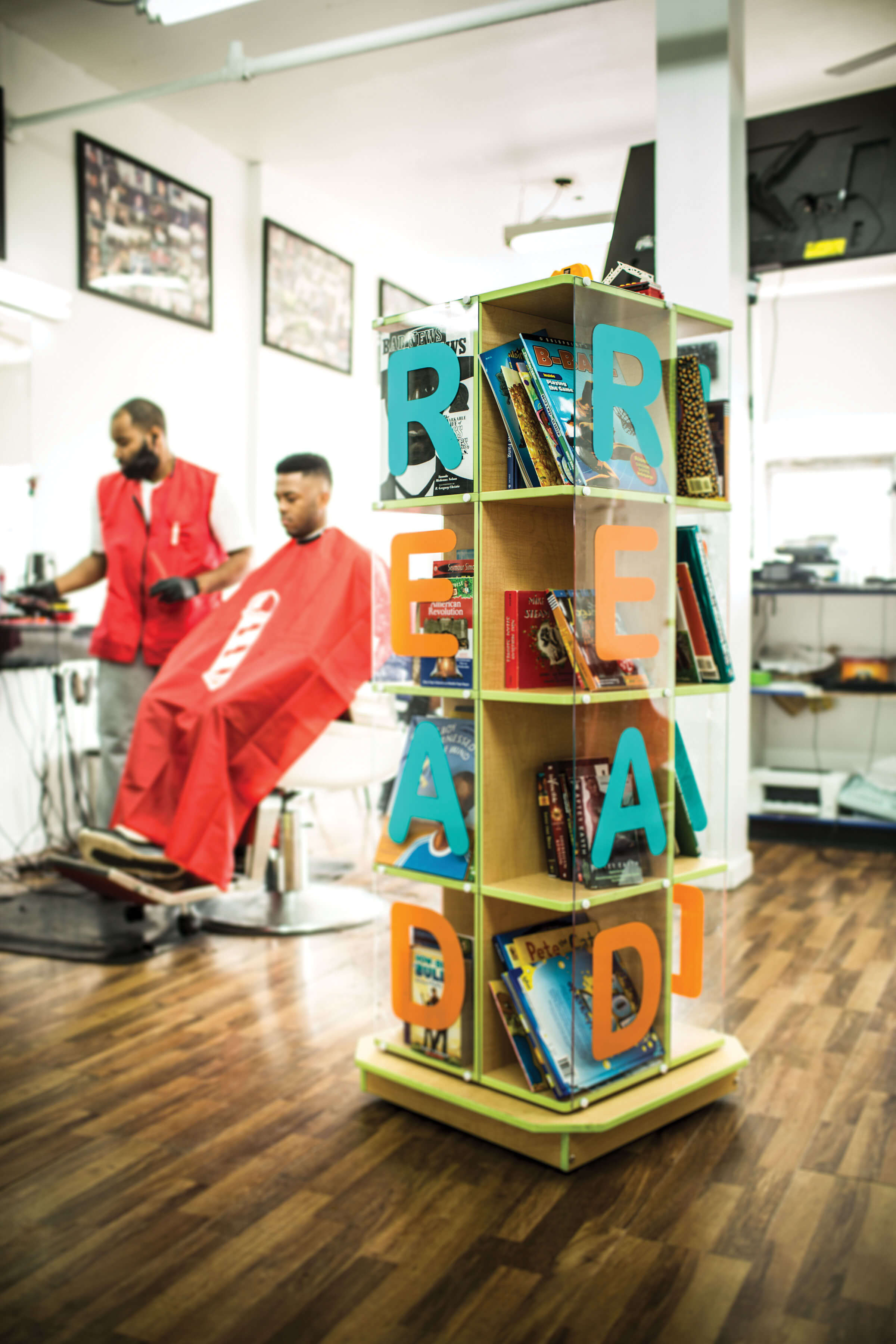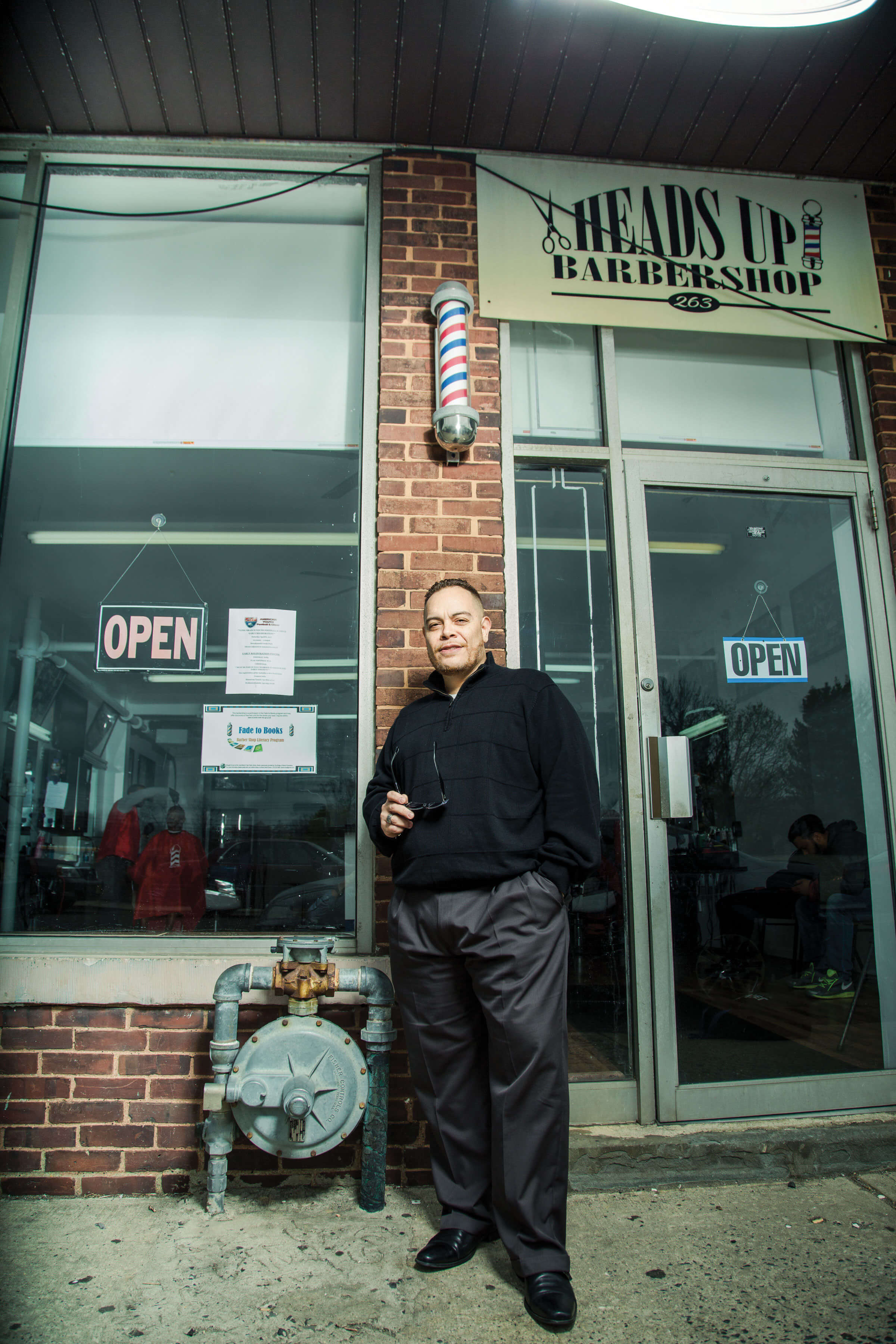
A cut above the rest
David Perez ’17M and an innovative program are making an impact on youth literacy.
It’s late afternoon in Long Branch, New Jersey, and the local kids are streaming out of school. Some catch a bus home. Some stop for a bite to eat with friends. And some saunter into Heads Up, a barbershop on Morris Avenue. The owner, Micah Goff, has turned off the TVs and dropped the music volume low. He considers this quiet time for the children of the community. It’s a chance for them to stop by, set up shop at an island in the middle of the store, and get some homework done or grab a book from the shelves.

These aren’t simple magazine racks at the local “cheap cuts” shop. The children have hundreds of books to choose from, including the full set of Diary of a Wimpy Kid and other series. And the books are there in Goff’s shop—as well as in four other barbershops in the area—as part of the Long Branch Library’s Fade to Books Program. “I had a 3-year-old the other day,” says Goff of a young customer. “He’s sitting in the chair just reading away. The book was upside down and everything.”
That moment, the one in which a young child in the community shows excitement about reading, is the only thing Goff gets from this program. He doesn’t receive any funds (the books are all donated). In fact, in some cases, he’s losing money, offering up free cuts to kids who finish a book or return one they borrow. But that moment is really all Goff needs. “It’s beautiful,” he says.
The barbershop has long been a gathering place for the African-American and Latino communities. A spot to discuss community issues. To gossip a bit. To solve problems. So it made sense to Tonya Garcia, director of the Long Branch Public Library, to partner with the local barbers in an effort to improve literacy and reading rates among young children of color. The idea came to her after she watched a video posted to social media by a barber friend. The video, which focused on the importance of literacy in the African-American community, got her thinking how fundamental barbers are to local areas. “We need to really pay homage to the community leaders that are so important to our culture,” says Garcia, who is Latina. “I was sitting there, brainstorming a way I could unite our two roles—my role as a library director and his role as a barber. How can I bring the two together?”
She did a little research and found programs in New Orleans and Chicago in which libraries were teaming up with barbers to bring books into shops. It all made perfect sense. She just needed the right person to pull it all together.
Changing course
David Perez joined the Army in 1993. It was a move that took his mother by surprise—this young man, just 21, had graduated from Lehman High School, one of the best public schools in the Bronx, with Regents Honors and with a Gold Medal in its psychology program. He had spent two years at Nyack college, a Christian liberal arts school, with plans to go into the ministry. But he dropped out to join the Army. Perez enlisted for four years but accepted an honorable discharge after three-and-a-half years when he injured his knee in a training exercise in the Mojave Desert. He needed a new plan.
We take it for granted, but these are spaces for boys and men. In there, they talk about politics. They talk about sports. They talk about their wives, their families. They talk about their jobs, their hardships.
Nyack hadn’t worked out. The here-and-there jobs he worked prior to active duty weren’t career-makers. So he spent six years in the National Guard and earned his business degree online, followed by a good job in healthcare as a supervisor. By now, he was married for the second time, and the couple had seven children between them. Things were going well. “We had a mortgage. We had kids getting ready to go to college. We bought a timeshare. I had a brand new Tahoe,” says Perez. “We were actually living a very comfortable middle-class life.” But when the company reorganized, Perez found himself unemployed for the first time. “I really didn’t know what to do,” he says. “It was like the floor just dropped out from under me.” He tried working for FEMA. He tried selling cars. But nothing felt right, and he kept asking himself, “What am I really supposed to be doing in this life?”
As a disabled veteran, Perez was eligible for an additional VA educational benefit, vocational rehabilitation, so he launched himself right back into business moving toward his M.B.A. online. But in the midst of his first class for his degree, he stopped. “I thought, You know what? I don’t want to do this,” recalls Perez. “I don’t want to manage people. I don’t want to worry about spreadsheets. I don’t want it.” He called his counselor at the Veterans Administration Regional Business Office and told her he wanted to get into social work—and he wanted to go to Monmouth University, which ranks as one of the top social work programs in the country by U.S. News & World Report. Her advice: apply for the social work program, and if he got accepted, let her take care of the rest. “And that’s exactly what I did,” says Perez.
In 2015, Perez became a Monmouth graduate student in social work, focusing on international community development. He was part of the university’s Military Bridge Program, which allows active or retired military personnel to attend the university with tuition assistance.
As part of his work toward a degree, he took on an internship with the Long Branch Public Library.
Engaging Community
Tonya Garcia didn’t have plans at the start to hand the Fade to Books Program over to David Perez. He had been working with her on another community project as a library intern, but when Fade to Books started to take root, Perez seemed like the perfect guy for the job. He was familiar with the importance of barbershops in Latino and African-American communities. But he wasn’t sold on the idea. Sure, it sounded good—put books in a community gathering spot. But he didn’t see a big impact.

Then he floated the idea by a friend. “She sent me this video,” says Perez. “It was a CNN interview with a gentleman who is doing a similar project in Harlem.” That program worked with 10 barbershops, and it was thriving. Perez started doing the research and learned that the literacy rates of black and Hispanic boys are extremely low—some graduating high school at a seventh-grade reading level. “These kids are not really understanding what they can achieve,” says Perez. “Then the families, whether it’s because of socioeconomic reasons or whatever the case may be, don’t really know how to promote literacy or don’t have the ability to purchase books for the home.” Perez thought, We have to try to do something to help these boys. Suddenly, this whole barbershop idea made sense.
“We take it for granted,” says Perez, “but these are spaces for boys and men. In there, they talk about politics. They talk about sports. They talk about their wives, their families. They talk about their jobs, their hardships. And the boys will talk about whatever’s relevant to them. What new song came out. What new movie came out.”
Perez and Garcia thought if they put books in these spaces and offer an incentive (every 10 books read earns the child a free haircut), they’ll be making a difference. And so far, they have. Just months ago, there was talk about rolling out the Fade to Books Program statewide. That talk has turned into a grant. Now the state will be selecting 25 libraries throughout New Jersey to reach out to team up with five local barbershops in their areas. “We’re talking about 125 barbershops,” says Perez. And that’s a whole lot of kids.
Just weeks before he was set to graduate with his M.S.W., Perez was still working hard for the library and the program. In April, he attended the New Jersey Library Association’s annual conference and spoke on a discussion panel to an audience of New Jersey library directors. The Long Branch Public Library also received the 2017 “Innovative Partnership” award for the Fade to Books program at the conference. “With this internship,” says Perez, “I learned about ‘community needs assessment’; I made many network connections; I developed a passion for community development, and, in particular, for Long Branch.” Perez is hopeful that he’ll be able to continue his work with a library after he earns his degree. But as Garcia told him, “David, just don’t worry about that now. Finish school. Graduate.”
So Perez’s future, for now, is up in the air. But in some ways, his career path seems more solid than ever. “I’m not sure where I’ll land,” says Perez, “but one thing I do know is that it will be somewhere that allows me to engage in the community and advocate for development and change.”